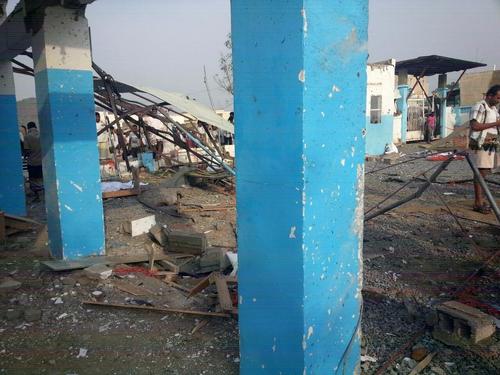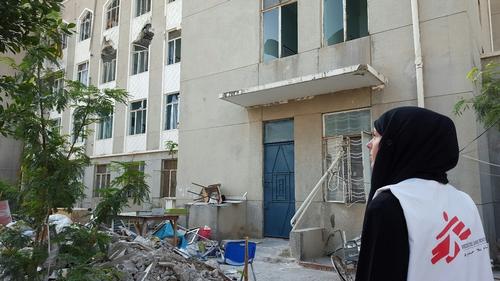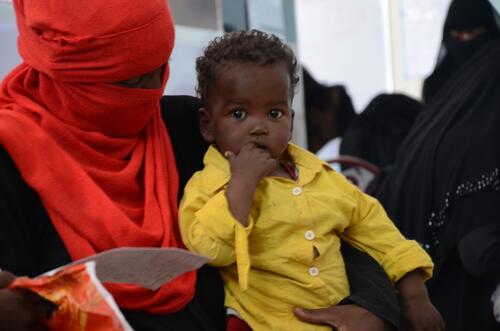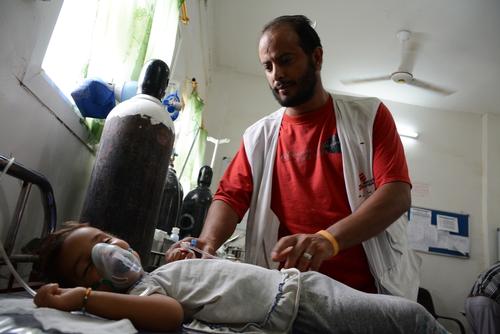War has escalated again in Yemen. The April ceasefire agreement came to a violent end with suspension of peace talks on 6 August. From Saada governorate in the north to Taiz governorate in the south, intense airstrikes have resumed and an MSF hospital in the northern city of Abs was hit by a Saudi-led coalition airstrike on 15 August. The damage from this attack is substantial: 19 people were killed and 24 were injured. For security reasons, MSF evacuated personnel from six MSF-supported hospitals in northern Yemen, where civilian casualties from airstrikes have been most intense.
“We talk about this airstrike because MSF was present in this hospital, and this is now the fourth MSF facility that has been attacked in the last 12 months. But there are other health centres, schools, markets, bridges … which have been attacked and destroyed by airstrikes, shelling or bombs,” said Hassan Boucenine, MSF head of mission in Yemen. “Such attacks create direct victims but the war also causes a lot of indirect victims within the population (economic failure, access problems, closing of hospitals, no health staff, etc).”
The indirect victims of conflict are numerous. They include people who are unable to access medical facilities for treatment – for example, patients requiring blood transfusions or women requiring emergency caesarean sections. Even where a medical facility is functioning, it will likely lack the capacity to provide medical care due to shortages of key supplies, personnel or medicine, or have no fuel to run its generator. Some health facilities are simply too dangerous to reach, so people have to make do without. On top of that, the war has caused Yemen’s economy to all but collapse, leaving many people with little or no income. Many have to choose between buying medicine and buying food for their family.
“Now that the violence has resumed, traveling to seek care is life-threatening,” says Laurent Sury, MSF’s head of emergency programs. Consequently, in the city of Haydan, located in Yemen’s northern Saada governorate, people are not traveling for health care, MSF has found.
In July, Haydan’s hospital was operating at full capacity and the MSF team provided 60 to 80 daily consultations. “Since the beginning of August, people are not traveling for care because they are afraid of using roads or they fear the hospital will be targeted,” said Sury, though the trip may be risked for emergencies, as was the case on 13 August. Two days before the Abs hospital airstrike, the MSF team at the Haydan hospital admitted 38 children after an aerial attack on what witnesses described as a Koranic school. Ten children were dead upon arrival, and 28 others who were wounded were stabilized before being transferred to the MSF-supported Al Jumhori hospital in Saada.
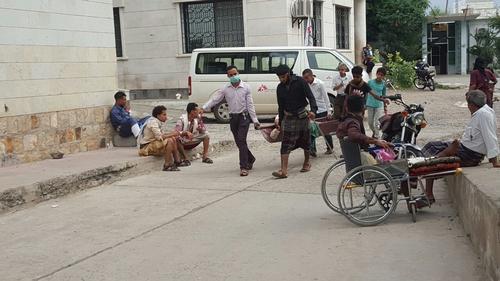
This same hospital in Haydan was partially destroyed by a coalition-led air strike in October 2015. The ceasefire agreement enacted in April allowed the MSF team to return and rehabilitate the maternity ward and emergency room. Internally displaced people returned; children and pregnant women sought consultations. However, with insecurity now rife, residents are seeking shelter in caves during the day, and accessing medical care is very difficult.
In the south of Yemen, the situation is critical. In the besieged frontline city of Taiz, active fighting occurs in the city centre, where both the Houthi and armed groups supported by the Aden government are engaged in heavy battles in densely populated residential neighbourhoods on a daily basis. On 18 and 19 August alone, 129 wounded were admitted to MSF-supported hospitals. Inhabitants of the besieged part of the city struggle for food and water. MSF provides support to four hospitals, but access to care is limited because of security concerns. On 2 December 2015, a Saudi-ledcoalition airstrike hit an MSF tent clinic in Taiz, killing one person wounding nine others. On 3 October, the MSF-supported Al Thawrah hospital was hit by rockets launched by the Houthis, injuring seven medical staff working in the emergency room.
With airstrikes, front line combat, and attacks like the 29 August suicide bombing in Aden, violence has fully resumed in Yemen. The population had only a few months of limited respite, and now the conflict continues to claim yet more direct and indirect victims.



